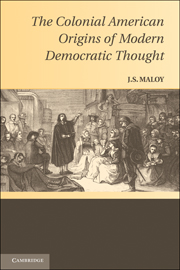Book contents
- Frontmatter
- Contents
- Preface
- 1 Introduction: Accountability and Democratic Theory
- 2 Radical Trust and Accountability in the Seventeenth Century
- 3 Fidelity and Accountability in Virginia and Bermuda
- 4 Politics and Ecclesiastics in Plymouth and Massachusetts
- 5 Constitutional Conflict and Political Argument at Boston
- 6 Democratic Constitutionalism in Connecticut and Rhode Island
- 7 Conclusion: Anglophone Radicalism and Popular Control
- Bibliography
- Index
1 - Introduction: Accountability and Democratic Theory
Published online by Cambridge University Press: 03 December 2009
- Frontmatter
- Contents
- Preface
- 1 Introduction: Accountability and Democratic Theory
- 2 Radical Trust and Accountability in the Seventeenth Century
- 3 Fidelity and Accountability in Virginia and Bermuda
- 4 Politics and Ecclesiastics in Plymouth and Massachusetts
- 5 Constitutional Conflict and Political Argument at Boston
- 6 Democratic Constitutionalism in Connecticut and Rhode Island
- 7 Conclusion: Anglophone Radicalism and Popular Control
- Bibliography
- Index
Summary
Democracy appears to be the master concept of the world of politics today. Yet a treacherous terrain confronts those who would understand it – whether as students and theoreticians or as participants and practitioners, and equally in societies long known as “democracies” as in those newly embarking on “democratization.” This book investigates a neglected phase of the history of ideas which can supply a useful compass for navigating the rough country of democracy and the scholarly literatures devoted to understanding it. It is based on research into various texts of the early and middle seventeenth century relating to colonization and constitutional design in the English-speaking Atlantic world. The magnetic north it proposes for democratic theory is the principle of accountability.
I will show how the principle of democratic accountability was adapted for and applied to modern political conditions, arguably for the first time anywhere, in England and America in the middle 1600s – perhaps surprisingly, in the colonies fully a decade prior to the metropolis. These conceptual developments accompanied and facilitated the founding of new states on the American continent by way of written constitutions. Some of these earliest colonial constitutions attempted to construct forms of government that may be regarded as genuinely democratic in modern terms: elective, representative, and constitutionally limited, but above all seeking popular control through non-electoral institutions of accountability. And the political debates of some of the colonists reveal, to an extent much underestimated before now, the theoretic underpinnings of these constitutional constructions.
These colonial American developments arguably represent the birth of modern democratic theory.
- Type
- Chapter
- Information
- Publisher: Cambridge University PressPrint publication year: 2008



